A Social Quid Pro Quo
About ten years ago I started thinking about retiring. I lived in Mexico and was teaching university students online, having already stepped back from the most active elements of my career working as a consultant for large organizations. A few years later, I moved back to the US and slowly wound down my teaching work. It took me a few years to go from “thinking about it” to making it official, but for the last three years I have been fully retired.
At first it was kind of nice; I had no serious responsibilities. I had no clients to call, no student papers to correct, and no research duties. Life was good…for a couple of months.
However, after catching up on my reading list and binge-watching Game of Thrones, I started to get bored. I started to not have a reason to get out of bed in the morning. I would lie there and think about what I had to do that day: Let’s see…coffee, read the local paper (bad news), surf the net (more bad news), and walk my dogs (the high point of my day). I started to wish I had kids and grandkids. Maybe I could offer some sage advice about something or nurture a sick child. Anything to make me feel like I was being of value as I had when I felt my clients and students held me in some regard. I had no real friends nearby so visiting them was out of the question.
I had lived in this state of mind for a few months when I started to realize it was affecting my mental health. I was starting to feel depressed...
Fortunately for me, my wife was beginning to wind down her career and that helped give me some much-needed social interaction. But still, I needed to be needed–like I was when I had a career.
Then one day I stumbled onto an article in the local paper written by someone who was a local “Master Gardener”. I figured if you were a master gardener then you must have a degree in botany or horticulture or something. But I was interested, and a blurb at the end of the newspaper column gave a web address for the organization, so I checked it out.
The first thing that caught my eye on the Master Gardener website was that they had something called the helpdesk. The helpdesk would diagnose your plant problems and give you possible solutions. Cool! The second thing I noticed was that they were looking for volunteers to join their organization. I wondered what it would be like to volunteer as a master gardener, so I inquired.
Long story short: I didn’t spend ten years thinking about this opportunity. I signed up, got interviewed and accepted, went through the formal training (quite extensive), and started doing my volunteer hours. Now, I am one of the people who mans the helpdesk.
Three things of value have come out of my master gardener experience. First, I am learning so much about plants and gardening, always been a casual interest of mine. Second, I have developed a new social network with a variety of interesting people with distinct backgrounds. Third, I am being of service to my community.
If you are a senior, and retired, volunteering is a great way to make friends and serve others in your community. It’s a great way to put some meaning back into your life.
Why Volunteer
Social participation. In a previous blog I discussed the relationship between loneliness and depression. I advocated for developing and maintaining a social network to stave off loneliness. Volunteering is an excellent way to do that and at the same time create the feeling of satisfaction that comes with being of service.
Research has s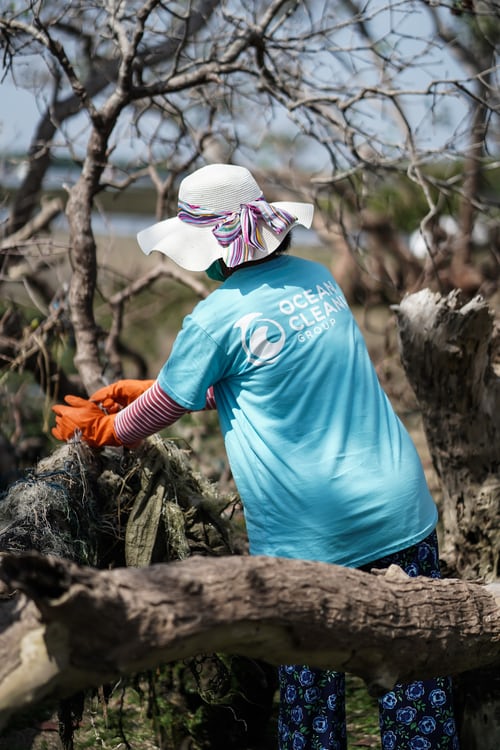 hown that active and productive engagement in society is a key element in successful aging. When seniors increase their levels of social participation, we have a reduced rate of suicide, better physical health, reduced mortality in general, and higher levels of psychological well-being. Research has also shown that volunteering can help prevent depression.
hown that active and productive engagement in society is a key element in successful aging. When seniors increase their levels of social participation, we have a reduced rate of suicide, better physical health, reduced mortality in general, and higher levels of psychological well-being. Research has also shown that volunteering can help prevent depression.
Being of service. Even if your social life is robust, and your primary focus is not on expanding your social network, you can reap the psychological benefits of being of service to individuals and your community. Being a master gardener volunteer, I get to help people solve problems with their plants, develop and deliver library talks on a variety of gardening related topics, and establish a network of new friends in my community.
Another way I volunteer is by writing blogs for Love of Aging that, hopefully, inform seniors of things they can do in their lives that can support their successful aging.
Researchers have looked directly at the health benefits of volunteering as we age. One study concluded that for seniors, volunteering has a negative relationship with mortality; seniors that volunteered had a 44% lower rate of mortality than seniors that did not volunteer.
Another study showed other significant positive results for seniors who volunteered: Older volunteers reported a wide variety of benefits to the people they served, themselves, their families, and communities. More than 30% reported that they were “a great deal better off” because of volunteering, and almost 60% identified a benefit to their families.
Being of service to the community not only helps the members of the community that are being served but also those that are being of service.
Types of Volunteer Service
There are a large variety of volunteering opportunities available to seniors. One way to get our head around them is to organize them into different models. Here is an example of five distinct but overlapping models for understanding the nature of a specific volunteering opportunities:
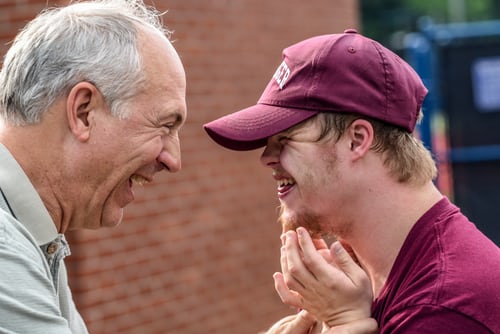 Formal. These types of opportunities tend to be more formally organized and involve the delivery of services. These roles tend to be more strictly supervised and more highly structured.
Formal. These types of opportunities tend to be more formally organized and involve the delivery of services. These roles tend to be more strictly supervised and more highly structured.
- Volunteering for the library cart in a local metropolitan hospital
- Delivering meals to older adults through services such as Meals-on-Wheels
- Providing activities and outing support in an aged care facility
- Volunteer driver for a service organization
- Volunteer animal care giver for organizations such as the ASPCA
- Volunteering in tourism, museums, large charities and emergency services
Informal. Non-formal volunteering occurs in a variety of community settings. This type of volunteering is done in local communities and centers around specific social needs. Volunteers work in unfunded, less structured settings.
- Volunteering for a neighborhood group
- Running the snack bar for a community sporting or recreational group
- Coordinating the sale of merchandise for a self-help group
- Volunteering for a specific hobby group
- Providing services or support through a mutual support group
Governance. Governance volunteers serve on boards and management committees. They provide leadership and direction for the organization.
- Secretary for the local soccer club
- President of a service club, such as a local chapter of the Kiwanis
- Serving on the board of an NGO
Social action. Social action groups are similar to non-formal groups in that people come together around a shared interest but differ in that social action groups have an interest and passion for bringing about defined changes.
- Volunteering for an environmental group
- Political lobbying
- Getting out the vote
- Volunteering for a community action group
- Lobbying for change for a specific target group of people or cause
Projects. Project work is for people with specific periods of time available and are seeking out volunteer opportunities with clearly defined timeframes. These opportunities typically involve high levels of volunteer involvement over a short period of time. The idea is that the volunteer has a specific set of skills that can be brought into an organization for a specific project.
- Volunteering to oversee the plan and construction of a new building
- Running or assisting at a specific event
- Redesigning the website for an organization
- Volunteering to write a marketing plan for a community group
Volunteer Opportunities
Ready to stop thinking about it and volunteer? If you type into your web browser “volunteer opportunities” the search results will be overwhelming. There are thousands of opportunities out there. Here are ten examples from one website I found:
1. Animal Rescue Shelters. Local animal shelters almost always need volunteers. There may be administrative opportunities or working with the animals like dog walking.
2. National Parks. You can help maintain trails, gather scientific information, and even act as a docent.
3. Food Pantries. Food pantries and soup kitchens can always use a helping hand organizing a local food drive, raising money, or simply handing out hot meals to those in need.
4. Habitat for Humanity. Brush up or develop home DIY skills while helping other less fortunate folks find shelter.
5. Local Libraries. Libraries typically need help organizing shelves and assisting patrons, and you may also be of help setting up and running public events, such as author signings and book fairs.
6. Art Museums. Get involved in the community by volunteering for family programs and children’s activities at your local museum. Once you build up your knowledge base, you may qualify to be a tour guide or event planner.
7. Political Campaigns. No politician gets elected without volunteers manning the phones, distributing fliers, raising money, and answering emails. This kind of work can provide you with valuable experience on many levels and can be applied to a host of different industries.
8. YMCA. You can volunteer to help both children and adults, strengthen your leadership skills by c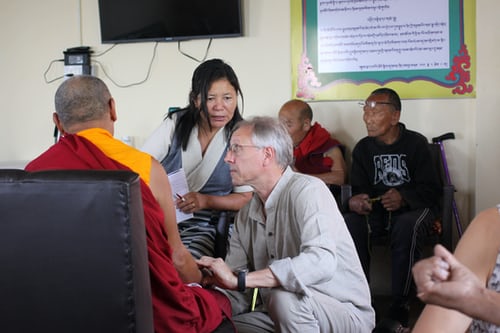 oaching a sports team, or pick up some valuable teaching experience by tutoring literacy courses.
oaching a sports team, or pick up some valuable teaching experience by tutoring literacy courses.
9. Retirement Homes and Senior Centers. Offer to give a lecture or teach a class. Offer your services utilizing your set of skills
10. Red Cross. If you don’t feel like giving blood, why not greet and assist customers looking to do so? Your skills may make you a good fit for grant writing, performing clerical tasks, or managing other volunteers. If you’ve got the drive, you can draw on any number of talents to help the Red Cross
Win-Win
Volunteering can make you feel better and actually help you live longer. That’s a big win for the volunteer, but also there is a win for the organizations we support and the individuals we directly assist. Put yourself out there and meet people and support your community. It’s good for you and good for them.
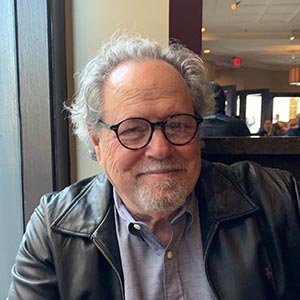 Ed Lopez, PhD, Love of Aging’s Science Editor is a retired organizational psychologist, university instructor and researcher. His research has been presented at international conferences and published in a peer reviewed journal. Ed is also a decorated Army veteran who served in Vietnam.
Ed Lopez, PhD, Love of Aging’s Science Editor is a retired organizational psychologist, university instructor and researcher. His research has been presented at international conferences and published in a peer reviewed journal. Ed is also a decorated Army veteran who served in Vietnam.
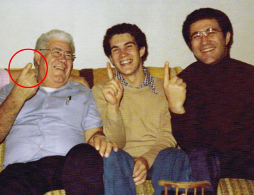 The index finger plays an important role in gripping a golf club and there was a strong possibility my dad wouldn’t be able to play golf again. That was bad news because his passion was playing golf on weekends.
The index finger plays an important role in gripping a golf club and there was a strong possibility my dad wouldn’t be able to play golf again. That was bad news because his passion was playing golf on weekends. 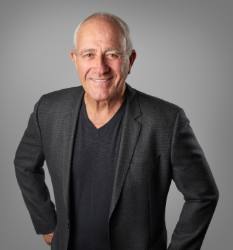 After completing 40 years as a creative director and educator in advertising, Julian Ryder founded The Right Brain Project—a creativity education and training firm helping leaders build creative cultures within their organizations. He is also an activist with The Hunger Project and ArtCenter College of Design in Pasadena. When not working, you’ll find Julian playing golf, skiing, or surfing.
After completing 40 years as a creative director and educator in advertising, Julian Ryder founded The Right Brain Project—a creativity education and training firm helping leaders build creative cultures within their organizations. He is also an activist with The Hunger Project and ArtCenter College of Design in Pasadena. When not working, you’ll find Julian playing golf, skiing, or surfing.

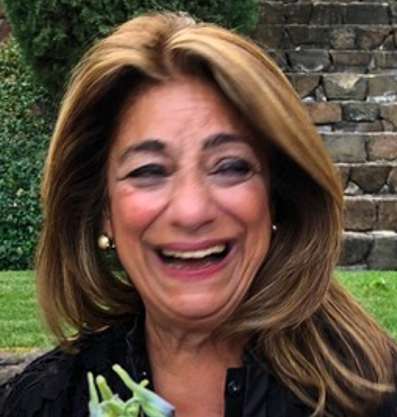 Lily Starr has been an educator her entire life, first as an award-winning primary school teacher of gifted and challenged students in the fourth and fifth grades, followed by 47 years of leading and managing the delivery of transformational programs in North America, Europe, Israel and Australia. Lily has been married for 50 years and she and her husband Gordon spend most of their time in their primary home in San Francisco.
Lily Starr has been an educator her entire life, first as an award-winning primary school teacher of gifted and challenged students in the fourth and fifth grades, followed by 47 years of leading and managing the delivery of transformational programs in North America, Europe, Israel and Australia. Lily has been married for 50 years and she and her husband Gordon spend most of their time in their primary home in San Francisco. 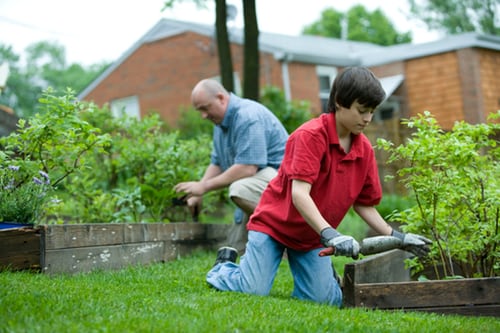
 hown that active and productive engagement in society is a key element in successful aging. When seniors increase their levels of social participation, we have a reduced rate of suicide, better physical health, reduced mortality in general, and higher levels of psychological well-being.
hown that active and productive engagement in society is a key element in successful aging. When seniors increase their levels of social participation, we have a reduced rate of suicide, better physical health, reduced mortality in general, and higher levels of psychological well-being.  Formal. These types of opportunities tend to be more formally organized and involve the delivery of services. These roles tend to be more strictly supervised and more highly structured.
Formal. These types of opportunities tend to be more formally organized and involve the delivery of services. These roles tend to be more strictly supervised and more highly structured. oaching a sports team, or pick up some valuable teaching experience by tutoring literacy courses.
oaching a sports team, or pick up some valuable teaching experience by tutoring literacy courses. Ed Lopez, PhD, Love of Aging’s Science Editor is a retired organizational psychologist, university instructor and researcher. His research has been presented at international conferences and published in a peer reviewed journal. Ed is also a decorated Army veteran who served in Vietnam.
Ed Lopez, PhD, Love of Aging’s Science Editor is a retired organizational psychologist, university instructor and researcher. His research has been presented at international conferences and published in a peer reviewed journal. Ed is also a decorated Army veteran who served in Vietnam.